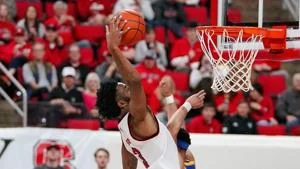Americans overwhelmingly support academic emphasis in college sports and are skeptical of federal or state government legislation for the historic transformation of the industry sweeping across the nation’s public and private universities, a poll released Wednesday says.
“The results of this public opinion poll are a timely and invaluable resource for lawmakers and leaders in Division I athletics to consider as they shape policies and legislation over the next several months,” said Len Elmore, cochairman of the Knight Commission on Intercollegiate Athletics. “It is important to know that the public overwhelmingly supports keeping college sports connected to its academic mission, even with the historic shifts on other issues like college athlete compensation.”
Respondents said it is very or extremely important (81%) for athletes to be enrolled full-time and taking classes; very or extremely important (81%) for athletes to graduate (81%); and very or extremely important (74%) for teams to graduate at least half of athletes to be eligible for postseason competition.
Regulation of college sports had no majority, with only 6% saying the federal government should handle it and 9% putting it with state governments. The NCAA should continue to regulate it, said 35%; sport governing bodies (25%) drew second-most support and 15% said neither of those choices or the athletics conferences (10%) should do it.
Allowing players to accept compensation began in 2021 through third-party, donor-backed collectives. On July 1, the $2.8 billion antitrust settlement – known as the House settlement for former Arizona State swimmer Grant House – authorized by a federal judge in June was enacted. This allows each NCAA school – there are 350 in Division I, and 1,100 in all three divisions – to pay athletes for use of their name, image and likeness.
The acronym is NIL, and it impacts 200,000 athletes on the Division I level, and about 500,000 throughout the NCAA.
“When we conducted this survey, we didn’t know how the results would turn out,” said Amy Privette Perko, CEO of the Knight Commission. “From our perspective, it’s very encouraging that the public showed clear and strong support. The education mission and college sports mattered, and the value of opportunity.”
The Knight Commission, soon to complete its 35th year, and the Elon University Poll worked with marketing and polling firm YouGov to sample 1,671 adults ages 18 and older on July 7-11. The final dataset was 1,500 and the margin of error is +/- 2.9%.
Opportunity value was evidenced in questions related to women’s and Olympic sports up against revenue sports such as football and basketball. The respondents said it was important (68%) for institutions to offer sports other than those tied to revenue generation.
Pay for play was mixed. The funding source for university payments to athletes for name, image and likeness and revenue sharing was strongly tied (71%) to fundraising and private support. Media and branding rights (56%) were the next chosen funding source, followed by ticket price increases (35%), reducing coach and staff salaries (30%), dropping sports (20%) and higher student tuition and fees (10%).
Asked about classifying athletes as university employees, for all sports 43% said no and 21% said yes; for revenue sports, 36% said no and 30% said yes.
The poll answers were inconclusive for negotiating with athletes on pay, rights and responsibilities (42% support, 30% oppose), and athletes’ ability to transfer without penalty (38% oppose, 36% support).
Elmore, Perko, Beth Brooke of the Knight Commission and Jason Husser of the Elon Poll said the results were timely even before legislative and presidential action of the last two weeks.
The SCORE Act, known also as House Resolution 4312, passed through two U.S. House of Representatives’ committees. Energy and Commerce gave approval (30-23) as did Education and Workforce (18-17), each on July 23.
The next day, second-term Republican President Donald Trump authored an executive order entitled Saving College Sports. He called it an “out-of-control, rudderless system in which competing university donors engage in bidding wars for the best players, who can change teams each season.” He cited more than 30 states enacting laws “in a chaotic race to the bottom.”
“It is clear that many people are still trying to understand new rules on athletes’ compensation, transfers, conference realignments and other issues,” Husser said. “Many people who don’t follow college sports closely are still learning about the new environment and forming their opinions based on what they read and hear about these issues. That’s why we see much more definite views among college sports fans and more uncertainty among casual observers.”
Husser said as more athletes’ stories become known, stronger and more knowledgeable opinions are likely to form.






